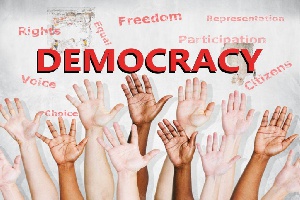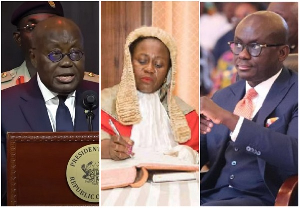Opinions of Thursday, 23 March 2023
Columnist: Richard Asamoah, Contributor
Time for African leaders to look beyond American democracy
Time has come for African leaders to look inward and come up with a representative government not fashioned after American democracy.
This becomes imperative because of another “Summit for Democracy” being organised by America where many African leaders have been invited to be “lectured” by President Joe Biden on democracy.
A grassroots politician in Nigeria, Raphel Adeyanju is convinced that many African countries will continue to be in crisis if they did not develop a government that will take into consideration, the culture and values cherished by their people.
To him, America is not in position to teach Africans how to govern their countries.
Indeed, America’s hypocrisy when it comes to democracy is its own history of institutionalised racism and discrimination. For centuries, the US was a slave-holding nation, where African-Americans were bought and sold as property, denied basic human rights, and subjected to brutal violence. Even after the abolition of slavery, African Americans continued to be oppressed through Jim Crow laws, segregation, and widespread discrimination.
The US only began to fully recognise the civil rights of African Americans in the 1960s, after decades of hard-fought battles and social movements. This dark history makes it difficult for the US to claim any sort of moral superiority when it comes to democracy.
Furthermore, the US's own democratic institutions have come under attack in recent years, calling into question its ability to serve as a model for other countries. In 2021, supporters of former President Donald Trump, who refused to accept the results of a democratic election, stormed the US Capitol. This attack on the very heart of US democracy was a shocking reminder of the fragility of democratic institutions, and the danger posed by those who would undermine them. Additionally, recent attempts to suppress voting rights and limit access to the ballot box have cast doubt on the US's commitment to democratic principles.
The US's track record in international affairs also calls into question its credibility to lecture African countries about democracy. The US has a long history of supporting authoritarian regimes and overthrowing democratically elected leaders in other countries, often to protect its own interests. For example, in 1973, the US supported a military coup in Chile that overthrew the democratically elected government of Salvador Allende, and installed a brutal dictator, Augusto Pinochet, who ruled for decades. Similarly, the US has been accused of propping up dictators in Africa and other parts of the world, while ignoring or even undermining democratic movements.
Moreover, the US's current political climate is highly polarised and often hostile to democratic norms. The political discourse in the US has become increasingly toxic, with each side demonising the other and engaging in vicious personal attacks. The media landscape is also highly polarised, with many news outlets and social media platforms promoting misinformation and conspiracy theories. All of these factors contribute to a political environment that is not conducive to democracy, and make it difficult for the US to claim any sort of moral authority when it comes to lecturing other countries about democratic values.
Adeyanju said: “The problem with American democracy, which is also afflicting some African countries that fashioned their democracies after their presidential system of government, is firstly, money and identity politics, in some African democracies including Nigeria. You must be a moneybag to contest and win major elections and you must be associated with godfathers or cabal.
The effect of this is the corruption that follows when the candidate wins and assumes office. The other unpleasant aspect, which is causing tension and violence is the multi party system borrowed from the West. This system causes high tension before, during and after the election. It also affects the social fabric of those countries copying the American brand of democracy because it creates a class of the wealthy while the majority live in abject poverty.
“Though there is no perfect democracy anywhere in the world, my belief is that Africa and by extension Nigeria, will do well by fashioning their democracy after their values, biases and culture. If you look at Nigeria for instance, our politics is influenced to a greater extent by ethnicity, religion and our common values."













